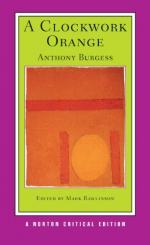|
This section contains 5,007 words (approx. 17 pages at 300 words per page) |

|
SOURCE: “Décor as Theme: Literature/Film Quarterly, Vol. IX, No. 2, 1981, pp. 92-102.
In the following essay, Sobchack explores Kubrick's use of décor to emphasize the theme of violence in A Clockwork Orange.
… The film … manages to make poetry out of doorknobs, breakfasts, furniture. Trivial details, of which everyone's universe is made, can once again be transmuted into metaphor, contributing to the imaginative act.
… Emphasized or not, invited or not, the physical world through the intensifications of photography never stops insisting on its presence and relevance.
—Stanley Kauffmann1
Because cinema visuals are intellectually clumsy (having no prepositions, conjunctions or grammer to speak of) the commercial cinema's natural tendency, at least in its present stage of development, is to disguise metaphors as props, decor, setting, plot-symbols, locale, and so on.
—Raymond Durgnat2
In his adaptation of the Anthony Burgess novel A Clockwork Orange, Stanley Kubrick has purposefully used...
|
This section contains 5,007 words (approx. 17 pages at 300 words per page) |

|


